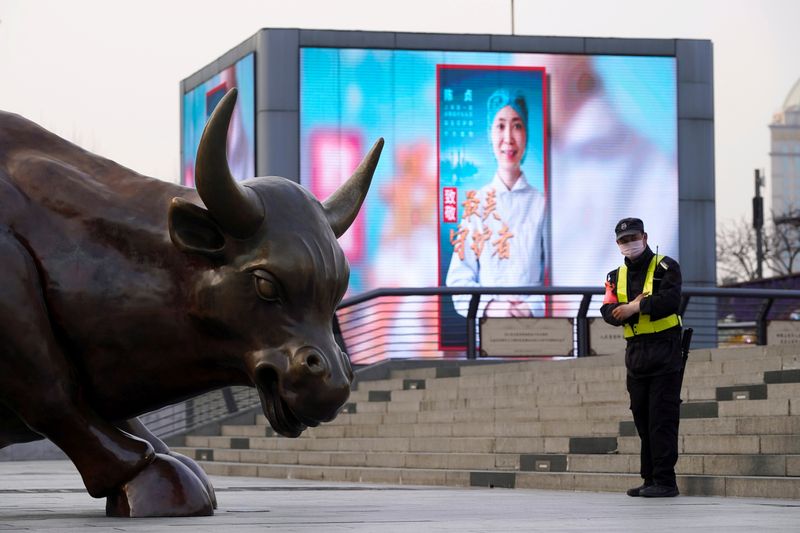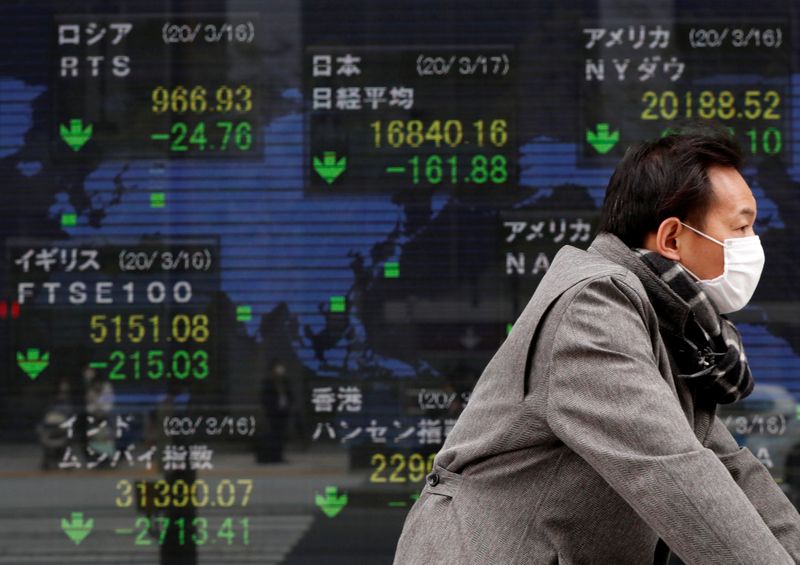By Shriya Ramakrishnan
(Reuters) - Asian stock markets struggled to make headway on Wednesday, while safe havens such as gold and the Japanese yen firmed as surging coronavirus infections in the United States took some of the shine off better-than-expected factory activity in China.
MSCI's broadest index of Asia-Pacific shares outside Japan (MIAPJ0000PUS) inched 0.2% higher, led by a 0.8% rise in Chinese blue chips (CSI300). But Japan's Nikkei (N225) fell 0.8%.
S&P 500 futures (ESc1) fell 0.5% and European futures were slightly negative.
Sentiment had been boosted by signs that China's factories are slowly gathering steam, with the Caixin/Markit manufacturing PMI rising to 51.2, compared with expectations for 50.5.
That followed firm U.S. housing data earlier this week. But it was accompanied by a surge in U.S. virus cases, a survey showing Japanese business mood souring and fears of growing Sino-U.S. tension over China's crackdown in Hong Kong.
Hong Kong police said they arrested a man holding a pro-independence flag in the first apparent use of new security laws that were imposed by China on its freest city late on Tuesday evening.
Hong Kong markets were closed for a holiday on Wednesday to mark the anniversary of the former British colony's return to China in 1997.
Meanwhile, the United States recorded its biggest single-day spike since the pandemic began.
The surge has prompted California, Texas and Florida to shut recently re-opened bars in the last few days, while Australia has locked-down parts of its second-biggest city, Melbourne, to try and stop a spike in cases there.
Markets are looking to U.S. manufacturing activity data due at 1400 GMT for the latest gauge of its economic recovery and expect a rebound. U.S. non-farm payrolls data on Thursday is also eagerly awaited and expected to show hiring.
"Things are turning up, but from very incredibly low levels," Robert Carnell, Asia-Pacific head of research at ING said of the recent run of better-than-expected economic data.
Equity investors' hopes for a rebound in corporate earnings looks "highly questionable now," he said.
"The bond market is much more realistic in it's pricing of what is going on, that we are not going to see a substantial improvement anytime soon."
The yield on benchmark 10-year U.S. Treasuries edged higher to 0.6709% on Wednesday, but had finished last quarter steady while U.S. stocks had their best three months in two decades. (N)
SIMMERING TENSION
Geopolitical tensions are also rising.
Washington has already begun rolling back Hong Kong's special status under U.S. law following Beijing's imposition of a new security law targeting sedition and subversion.
It was used for the first time on Wednesday when police arrested a man holding a flag advocating independence.
Further instability seems baked into Hong Kong stock prices, with the Hang Seng (HSI) left behind in last quarter's rally, adding just 3.5% compared with a 17.6% rise in MSCI's Asia ex-Japan index.
But the law seems to herald another round of U.S.-China friction. Global Times editor Hu Xijin said on Twitter that China will announce curbs on U.S. media in the country.
"It has not taken people by surprise, but it's an unwelcome development," Imre Speizer, a foreign exchange strategist at Westpac in Auckland, said of the Hong Kong laws.
"It's one of a number of geopolitical factors which is a negative for some asset classes now."
Currency markets shifted to a risk-off mood, with the trade-sensitive Australian dollar slipping and the yen gaining.
The yen rose 0.3% to 107.61 per dollar while the Aussie fell 0.2% to dip below 69 cents to $0.6890.

In commodity markets, gold
